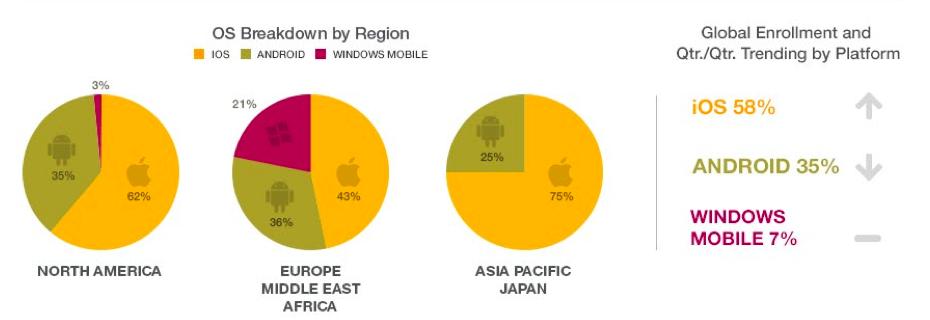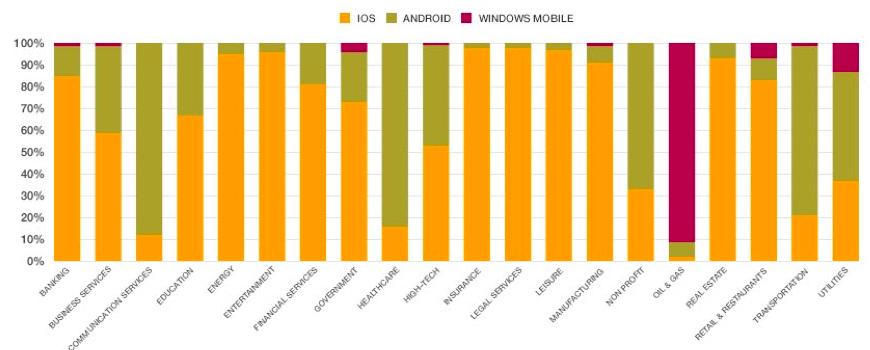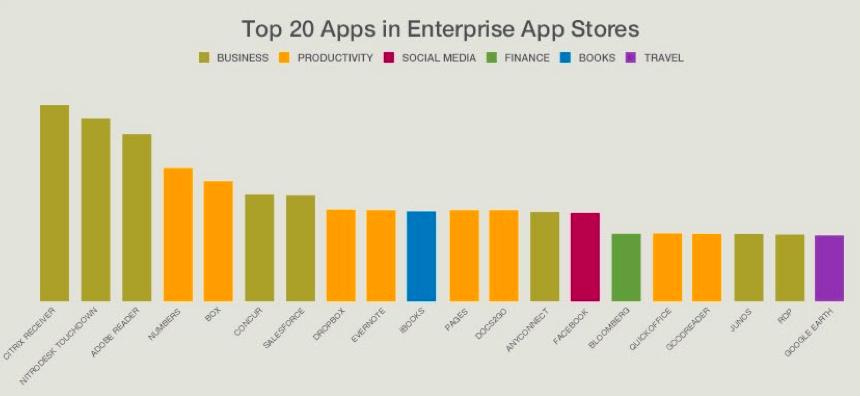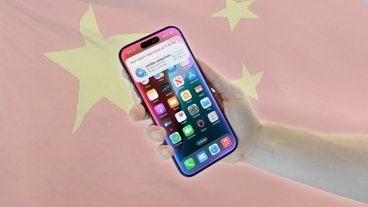A report by Citrix notes that Apple's iOS is not only the leading mobile platform globally, but is also experiencing the most growth in device enrollment, outpacing Windows Mobile and Android. Apple's Numbers and Pages were also cited at top productivity apps among enterprise users.
Citrix's numbers (PDF) reflect similar figures reported by Good Technology, although Citrix breaks down its global numbers by region and industry, and also highlights interesting data on the mobile apps being used in the enterprise.
Overall, Citrix states Apple accounts for 58 percent of the mobile devices it sees among its enterprise users. That's smaller than Good's 77 percent of activations for iOS in its mobile management tools.
Compared to Good, Citrix's user base tilts more toward Windows shops; the company's core product, Citrix Receiver, provides secure access to Windows desktops, apps and data. This makes it all the more surprising that, even among Citrix's group of Microsoft-aligned customers, Microsoft's own mobile platform has such little representation.
Android brings mobile malware to the enterprise
Citrix called particular attention to a unique aspect associated with "increased Android usage," specifically "the increase in mobile malware that the industry saw over the past year."
The firm cited figures from McAfee that detail that "unique malware samples detected in reputation systems" have risen to 40,000 for mobile devices in 2012, compared to the 50,000 to 100,000 sample afflicting desktop systems on a daily basis.
However, mobile malware is almost entirely a unique feature of Google's Android platform; McAfee stated that 97 percent of the mobile malware it discovered was "Android-based."
Enterprise share by region
The Citrix report notes that iOS's 43 percent penetration of Europe, Middle East and Africa (EMEA) is Apple's weakest territory, while in North America Apple has a 62 percent share and a 75 percent share of the Asia Pacific, Japan region.
North America represents a lion's share of the mobile device market, with 71 percent of Citrix's enrollments. The firm stated that for this region, iOS gained share "largely at the expense of Android."
EMEA represents 27 percent of all enrollments, and in that region Microsoft grew slightly while Apple's iOS lost 13 percentage points and Android gained 11. Asia accounts for only 2 percent of Citrix's enrollments, but in that region Android gave up 7 percentage points while Apple gained 7.
Overall, Android's global enterprise market share observed by Citrix fell by 2 percentage points, while Apple gained 2 points. Citrix reported no change in share for Microsoft among mobile devices.
Microsoft stagnant in mobile
Microsoft recently noted that IDC credited Windows Phone partners as having shipped more devices "than iPhone" in seven countries.
Nick Wingfield of the New York Times investigated, finding that those seven countries were Argentina, India, Poland, Russia, South Africa, Ukraine and "other central and eastern Europe," a region including Croatia. Wingfield noted that IDC only tracks official sales numbers, ignoring the "very significant gray market."
Just four years ago, Microsoft surpassed Apple in every country. One remaining stronghold for Windows is in the oil and gas industry, which Citrix noted as the only major segment dominated by that platform.
Apple leads in customer facing industries, Android among field service
Citrix called iOS the preferred platform for "industries in which mobile users engage customers one-on-one, such as retail and restaurants," while Android was preferred among "mobile field service organizations such as transportation and utilities."
The top industry for Android was communications services, while Citrix reported the platform saw "significant increase" in adoption among non-profits, education and communications. Citrix also credited Android for leading its healthcare adoption numbers, noting that "whereas anecdotally we see high iOS adoption in traditional hospital settings," the wireless mobility deployments it observed related to "mobile healthcare organizations such as home healthcare groups, and for them, Android has been the platform of choice since we've been measuring industry adoption."
The firm also noted that Apple's iOS had a commanding lead in the energy, legal and insurance industries, and its "adoption increased in transportation, government and retail and restaurants."
Apple's Numbers, Pages among Citrix's top enterprise apps
Apple's iWork apps aren't often recognized as "enterprise productivity software," but Citrix included Numbers and Pages (as well as Apple's iBooks) within its top twenty list of enterprise apps.
Numbers was the top spreadsheet and fourth most popular app overall, while Pages appeared to be the top word processing mobile app, ranked right behind iBooks at number ten. Apple's productivity titles were more popular than the competing Docs2Go or QuickOffice, a particularly notable fact given that Apple's apps are exclusive to iOS.
 Daniel Eran Dilger
Daniel Eran Dilger










-m.jpg)






 Charles Martin
Charles Martin
 Christine McKee
Christine McKee
 Wesley Hilliard
Wesley Hilliard
 Malcolm Owen
Malcolm Owen
 Andrew Orr
Andrew Orr
 William Gallagher
William Gallagher
 Sponsored Content
Sponsored Content








24 Comments
Now for feature parity between iOS and OS X, and to keep them 1:1 going forward.
"McAfee stated that 97 percent of the mobile malware it discovered was "Android-based.""
Even allowing for estimation error,that just about says it all.
iOS isn't surprising but iWork is as I only tend to think of it as a Mac suite. I had no idea Apple refers to Pages and Numbers as iWork on the App Store. It would be great if we see some major updates to Mac's iWork with the impending Mac Pro + Mac OS X 10.9 + AirPort updates.
Apple's Numbers and Pages were also cited at top productivity apps among enterprise users.
Apple's iWork apps aren't often recognized as "enterprise productivity software," but Citrix included Numbers and Pages (as well as Apple's iBooks) within its top twenty list of enterprise apps.
Numbers was the top spreadsheet and fourth most popular app overall, while Pages appeared to be the top word processing mobile app, ranked right behind iBooks at number ten. Apple's productivity titles were more popular than the competing Docs2Go or QuickOffice, a particularly notable fact given that Apple's apps are exclusive to iOS.
Boom.
Finally, once people discover the pleasure or working with fast and light apps, we will get rid of all that MS bloatware!